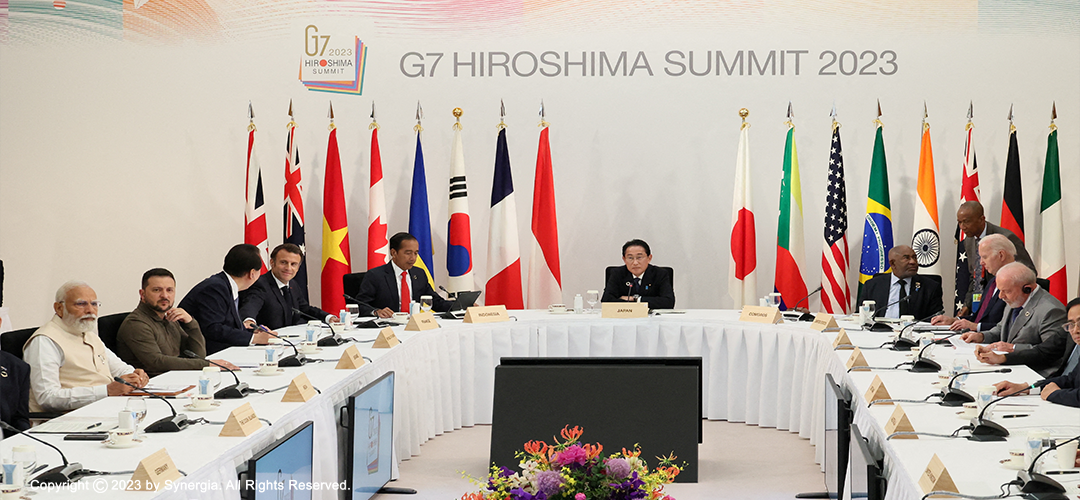G7 Hiroshima Summit: a Reiteration of Resolve?
June 9, 2023 | Expert Insights

The G7 leaders met in Hiroshima, Japan, on May 20-21, 2023, to discuss a range of global issues, including the war in Ukraine, the global economy, and climate change. The shadow of the Ukraine war and the cold war with China were clearly discernible in the gathering.
It was symbolic that at a time when the war in Ukraine was threatening to release the nuclear genie out of the bottle, the summit was held in the shadow of the Hiroshima Peace Memorial Park. The history of the memorial needs no elaboration. In their final communique, it was encouraging that the seven richest nations promised to "renew their commitment to a world without nuclear weapons."
Background
Undoubtedly, the G7 summit remains a significant global event impacting the globe. Whatever commitments are made at this high table by the elites of the international community, the rich and the powerful, directly influence the global economy, security and multilateralism. However, it has been seen that G7 is being increasingly distanced from the Global South, something that this esteemed body needs to contemplate and work on building trust with the vast majority of nations that are not as fortunate as G7 members.
Japan had worked hard on the summit, selecting a range of new and interesting threads to be pursued during the deliberations.
The leading one was the focus on economic resilience and security. The leaders agreed to "strengthen supply chains, reduce vulnerabilities, and counter malign practices that exploit and reinforce them." This is a significant shift in focus for the G7, which has traditionally focused on economic growth and development.
The focus on resilience and security reflects the growing recognition that the global economy is increasingly vulnerable to shocks and disruptions. While no names were mentioned, the educated guess was that China was clearly in the crosshairs. It was agreed that due to the measures enforced by the pandemic and now the war in Ukraine, the global economy has become more susceptible to shocks and disruptions. The damage has been severe and needs a global effort to repair it.
Another silver lining was that climate change was given the importance that it merits. However, merely acknowledging the danger it poses is irrelevant unless concrete actions are enacted on the ground to mitigate its effects. Sadly, this remains elusive yet.
The G7 leaders also discussed the global security situation. Expectedly, Russia was roundly condemned for its Ukrainian adventure and asked to end the conflict immediately. The growing Chinese military power was also discussed, and, in this vein, the G7 leaders vowed to collaborate to 'prevent misuse of critical and emergent technologies’.
The G7 leaders reiterated their support for multilateralism and open trade. They acknowledged that these are crucial for global prosperity and safety. The G7 leaders also committed to strengthening the international order based on norms. They acknowledged that a number of global issues, such as climate change, terrorism, and nuclear proliferation, can only be addressed through international cooperation.
In addition to the above-mentioned commitments, the G7 leaders consented to a number of additional significant initiatives. For instance, they consented to invest in renewable energy and mitigation of climate change, encourage gender equality and women empowerment, combat disinformation and bigotry and enhance global health protections.

Analysis
These are all significant issues in which the G7 can play a prominent role. The commitments made by the leaders provide a ray of hope to the Global South, provided these commitments are translated into actionable steps. The world is observing, and the G7 has to walk the talk.
China lost no time recognising the innate threat that the conclave held for its interests and accused the forum of its “Cold War mentality" and "attempt to divide the world." Additionally, China has accused the G7 of attempting to "contain" its rise.
Russia was close behind, calling out the G7’s unfair exposition on the Ukraine conflict while overtly and covertly “imposing its will” on other nations.
India applauded the G7's emphasis on economic resilience and security. India has also backed the G7's commitment to multilateralism and open trade. It supports measures for global security as the geopolitical situation around its periphery has been on a serious decline for the last few years.
Ukraine is another issue that demands an urgent and immediate termination. Whatever the merits and demerits of the justification or lack of it for the Russian invasion, the war has left no nation on the earth unaffected. Hence, its resolution should be the top priority for every forum, big and small.
Assessment
- Let us see how successful the G7 is in putting into effect the strategy that was agreed upon in Hiroshima. The forum should not become an extension of NATO to cobble together an anti-China/ Russia coalition. It should have a much broader international vision and rise above petty geopolitical contestations hamstringing the global economy and growth.
- To be able to implement its strategy, the group will also need to establish trust with other countries. The ongoing conflict in Ukraine is likely to define responses to the G7 strategy. Concerns have been expressed about the global security landscape and the need for cooperation to address common threats as a result of the war.
- China's expanding economic and military strength poses a threat to the established global order. The G7 must find ways to collaborate with China despite their divergent interests.








Comments